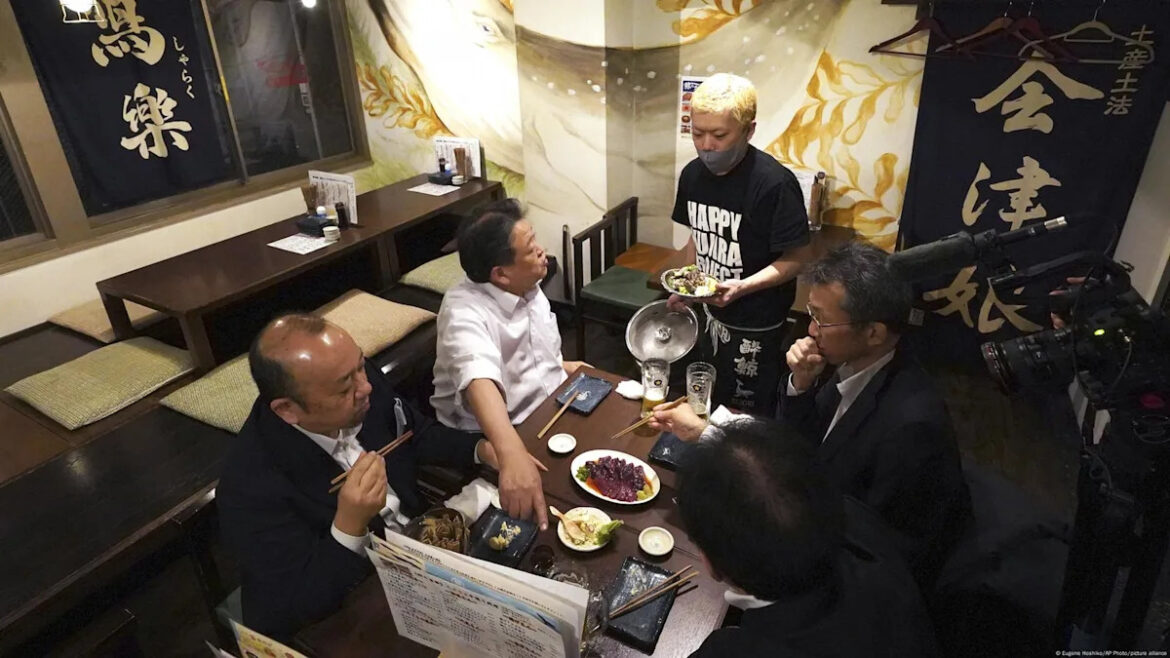The growing number of foreign visitors has been big news in Japan this year, along with headlines picking out the small minority who attract locals’ fury for misbehaving.
But even well-behaved tourists from North America and Europe are a source of irritation or confusion for many locals in Japan — due to the very un-Japanese habit of tipping.
More than 21.5 million foreigners visited Japan in the first half of 2025, a record high and on track to surpass the 40-million arrival mark for the entire year.
Many first-time visitors are befuddled by Japanese customs and norms; everything from taking one’s shoes off at the entrance to a home to bowing and eating with chopsticks.
There are also unwritten rules about how money is handled and offered that Japanese instinctively know, including that gifts of cash must be in a special envelope and that payments are not exchanged by hand but always placed in a tray.
Tipping is just one more pitfall in the minefield of Japan’s money culture, and the vast majority of Japanese people do not want Western-style gratuities to become the norm here.
![Tipping is not big among locals in Japan, and that's unlikely to change any time soon [FILE]<span class="copyright">Stanislav Kogiku/ZUMA/IMAGO</span>](https://www.alojapan.com/wp-content/uploads/2025/10/c68352cdc0250e3441f6dc87c21f12ee.jpeg)
Tipping is not big among locals in Japan, and that’s unlikely to change any time soon [FILE]Stanislav Kogiku/ZUMA/IMAGO
Good service is part of the job
“Quite often when I’m handing a bill to people I suspect are in Japan for the first time, I make a point of politely saying that one of the wonderful things about Japan is that tipping is not required, which immediately cuts out any awkwardness,” said Andy Lunt, a UK national whose Japanese wife’s family have run the Shin Hinomoto “izakaya” restaurant in central Tokyo since the late 1940s.
“Sometimes they will ask why, and I just say that’s the way it has always been here and that it’s a good thing they don’t have to pay an extra 20% when prices are going up like they have been,” he told DW.
“But it’s also that my staff and I do not think we need to be paid extra just to do our jobs properly,” he added.
“If anyone leaves cash on a table as a tip, they should not be surprised if my staff are chasing them down the street to give it back to them.”
The boom in foreign tourism to Japan is in part being fuelled by the weak yen, making everything seem relatively inexpensive to travelers, some of whom want to leave a small tip.
In some bars, coffee shops and restaurants, owners have started to leave a tip jar alongside the register. But this is still rare — and controversial, especially to the Japanese.
Cultural differences
Earlier this year, the Gyukatsu Motomura chain of beef cutlet restaurants caused a stir when social media users posted images of a tip jar at one restaurant.
“A tipping culture is bad. I’ve worked in the service industry and it does not take long before people feel they are owed tips,” one comment read.
“And then they say vile things about folks who don’t tip or only tip a small amount. They never seem to blame their employer though.”
Many owners hope the Western culture tipping remains uncommon in Japan, where good service is a basic requirement.
“It’s a cultural difference and we are just not used to being given tips,” said Mariko Shigeno, who until recently owned the La Tour restaurant in the Kamika district of Kanagawa Prefecture, south of Tokyo.
“For me, it is my job to make sure the service is good and there is no need to pay me extra for that,” she explained.
“I understand that tips are meant to show gratitude for excellent service, but I should already be giving excellent service.”
Taku Nakamura owns the Le Pipi d’Ange wine bar in Yokohama’s Motomachi district. After traveling extensively in Europe, he said he very much hopes that tipping does not become big in Japan.
“To me, it seems that tipping is one person showing off how much money he has to a person who is working in a low-level, menial job,” he said.
“In Japan, I think most people believe that a person should be able to earn enough money to live without having to need charity.”
Tipping unlikely to catch on
Ashley Harvey, a travel marketing analyst who has worked in Japan’s travel sector for more than 15 years, is confident that while some foreign visitors will continue paying small gratuities with their meals, the concept will not catch on among the Japanese.
He explains that the issue is not as common as some might think judging from the increased number of foreign visitors or from social media debates.
“Even though there has been a sharp increase in foreign tourists coming to Japan in recent years, the vast majority of them are from other parts of Asia, such as China, South Korea, Taiwan and so on, which also do not have a tradition of tipping,” he told DW,
“It really is a small minority of people who try to tip,” he added.
“I think that any restaurants or bars that feel this is really going to cause them huge problems should just put up a sign saying that tips are not required,” Harvey said.
And although he says he has seen “a few tip jars” around the place, they are far from becoming common.
“I’m pretty sure it is not Japanese people who are putting money in there,” he said.
Edited by: Karl Sexton


AloJapan.com